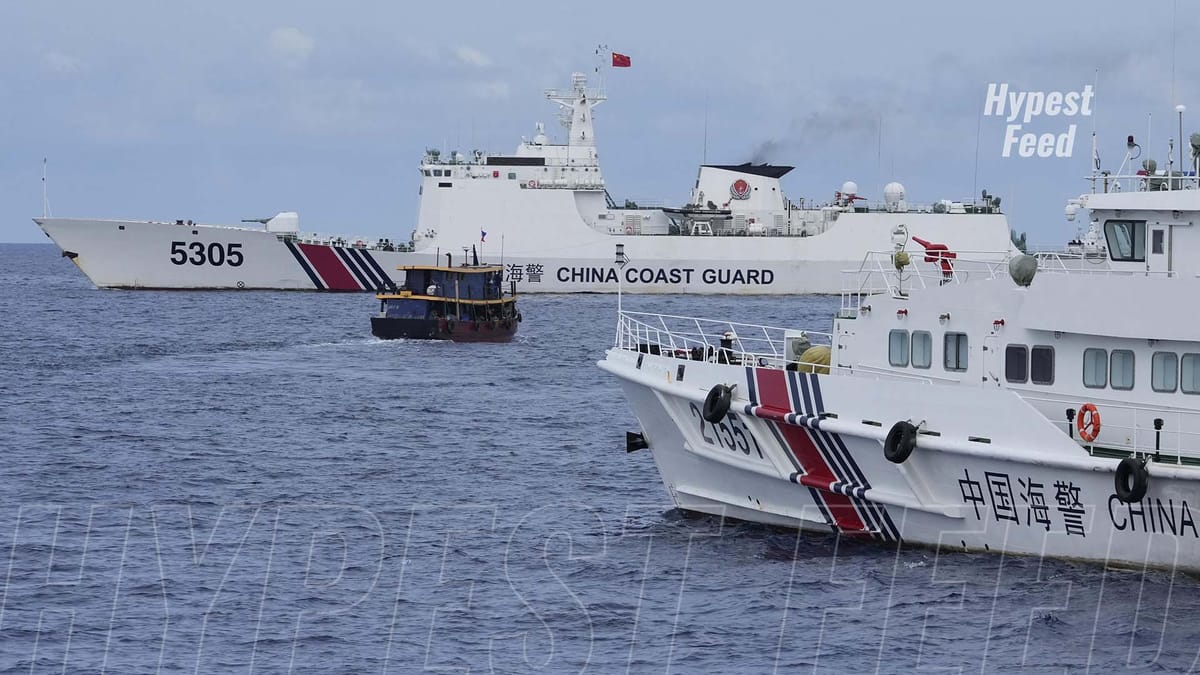China’s Attacks on Philippine Boats: A Prelude to Conflict over Taiwan, Experts Warn
Recent incidents involving Chinese attacks on Philippine boats have raised alarms among international observers and defense experts. These aggressive maneuvers are believed to serve multiple strategic purposes, primarily provoking the United States and preparing for a possible military engagement over Taiwan.
Escalating Maritime Tensions
The South China Sea, a critical maritime region, has long been a hotspot for territorial disputes involving China, the Philippines, Vietnam, Malaysia, Brunei, and Taiwan. China's expansive claims, backed by its "nine-dash line," cover almost the entire South China Sea, bringing it into direct conflict with other nations' exclusive economic zones (EEZs).
In recent months, the situation has intensified, with Chinese vessels reportedly harassing and attacking Philippine boats. These acts of aggression have included ramming, water cannon attacks, and the deployment of maritime militia to intimidate Filipino fishermen and naval forces.
Strategic Provocations
Experts believe that these provocations are not isolated incidents but part of a calculated strategy by Beijing. By targeting the Philippines, a key U.S. ally in the region, China is testing the resolve and response of both the Philippines and the United States.
Dr. James Li, a senior analyst at the Center for Strategic and International Studies, explains: "China's actions are a form of strategic signaling. They are demonstrating their willingness to use force to achieve their territorial ambitions while gauging the reactions from the U.S. and its allies."
Preparing for Taiwan
Beyond provoking the U.S., these aggressive actions are seen as preparations for a potential conflict over Taiwan. Taiwan, an island democracy that China considers a breakaway province, has been a focal point of Chinese military strategy for decades. The Chinese government has not ruled out the use of force to achieve reunification.
The tactics employed in the South China Sea serve as a testing ground for Chinese naval and paramilitary forces. The experiences and lessons learned from these encounters are likely being used to refine strategies that could be deployed in a conflict over Taiwan.
Colonel Michael Zhang, a retired officer of the People's Liberation Army, points out: "The South China Sea operations are crucial for training and assessing the readiness of our forces. The real objective is to ensure we are prepared for more significant challenges, such as Taiwan."
International Response
The international community has expressed growing concern over China's actions. The United States, under the Biden administration, has reaffirmed its commitment to defend the Philippines under the Mutual Defense Treaty. In a recent statement, U.S. Secretary of State Antony Blinken warned that "an armed attack on Philippine armed forces, public vessels, or aircraft in the South China Sea would invoke U.S. mutual defense commitments."
Japan, Australia, and several European nations have also voiced their support for the Philippines and called for the maintenance of freedom of navigation in the South China Sea. The European Union has emphasized the importance of adhering to international law, particularly the United Nations Convention on the Law of the Sea (UNCLOS).
The Path Forward
As tensions continue to rise, the need for diplomatic engagement and conflict resolution mechanisms becomes increasingly urgent. ASEAN (Association of Southeast Asian Nations) has been urged to play a more proactive role in mediating disputes and fostering dialogue among the involved parties.
However, the prospects for a peaceful resolution remain uncertain. China's assertive policies and the strategic importance of the South China Sea and Taiwan make it a challenging issue for all parties involved.
In conclusion, China's attacks on Philippine boats are a multifaceted strategy aimed at both provoking the U.S. and preparing for a potential conflict over Taiwan. The international community's response and the dynamics of U.S.-China relations will be critical in shaping the future of this volatile region. As the situation evolves, the balance between deterrence, diplomacy, and preparedness will be key to maintaining stability and preventing escalation into a broader conflict.



Member discussion: